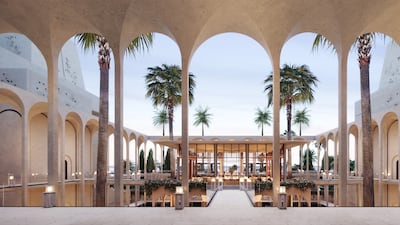Saudi Arabia's Red Sea tourism megaproject developer is considering a potential initial public offering or a real estate investment trust as part of its future growth plans, set against the backdrop of the kingdom's efforts to develop non-oil sectors.
Red Sea Global is currently in “very early stage” discussions with banks and stakeholders, the company's chief executive John Pagano told The National in an interview on Wednesday.
“Nothing is off the table. We are looking at all different options, amongst which would be an IPO, which is a normal evolution of a company like ours,” he said.
A potential listing could be on the cards for 2026 or 2027, after the destination opens to visitors and hotels establish a financial track record, proving the financial feasibility of the tourism industry in the kingdom, he added.
The size of the listing will depend on whether the company opts for an IPO or a Reit, which has yet to be decided, but “it will be big”, Mr Pagano said.
These large-scale tourism projects are part of the kingdom's efforts to diversify its economy, reduce its dependence on oil revenue, create jobs and attract foreign investment.
Developing strategic non-oil sectors such as tourism, aviation and hospitality are key pillars of the kingdom's Vision 2030 economic transformation agenda.
Saudi Arabia's sovereign wealth fund, the Public Investment Fund, in 2021 created Red Sea Global by merging two government-owned developers — the Red Sea Development Company and Amaala.
Together, the two projects will create 120,000 direct and indirect jobs created by 2030. This will contribute more than 10 per cent of the one million jobs in the tourism and hospitality sector that the kingdom is seeking to create.
Green financing
The first phase of the Red Sea project is “fully capitalised” and will not require further funding at this stage, Mr Pagano said.
In 2021, the company secured 14.12 billion Saudi riyals ($3.76 billion) in funding through the first locally denominated green financing credit facility for the first phase.
The company is considering raising about 10 billion riyals in green financing for the first phase of its Amaala project later this year or 2024, though no firm decision has yet been made, Mr Pagano said.
Amaala, an ultra-luxury destination focused on wellness, will feature more than 1,300 hotel rooms across eight resorts.
The firm is also proceeding with plans to sell luxury second homes within the Red Sea and Amaala projects in the third quarter of 2023 amid “high” levels of interest from the market, Mr Pagano said.
Project progress
The Red Sea, one of the world’s most ambitious regenerative tourism projects, is now getting ready to welcome its first visitors, with rigorous testing under way.
Three of its 16 resorts are scheduled to open this year.
The Six Senses Southern Dunes, a 76-key resort that makes the most of the region's inland wadis and mountains, is scheduled for a soft opening in July, Mr Pagano said.
The St Regis Red Sea Resort and Nujuma, a Ritz-Carlton Reserve, are in the final stages of completion and expected to open in September and October, he added.
By the end of 2024, 21 additional resorts at Red Sea and Amaala are scheduled to be completed and will start opening in 2025, Mr Pagano said.
The executive, with 35 years of international experience in the commercial property industry in Europe, North America and the Caribbean, expects the destination will welcome about half a million visitors at the Red Sea and Amaala once the first phase is completed at the end of next year.
The aim is to eventually attract a “50/50 split” between international and domestic visitors.
“The early stages will see a higher proportion of domestic visitors, not because the international interest isn't there, but because there is so much anticipation and pent-up demand in the kingdom. People are always asking me, 'when can I book?',” he said.
“Then as the destination opens and becomes more known, we will reach that long-term balance of half domestic and half international visitors.”
While global economic headwinds such as high inflation and commodity prices have contributed to increasing project costs, this will be largely offset by the rise in hotel room rates in Saudi Arabia and globally, he said.
Mr Pagano said he is not concerned about opening the project during a period of weaker global economic growth as “consumer confidence has not been dented” and demand for travel “remains robust”.
The project is a cornerstone of the kingdom's Vision 2030 agenda and the transformation of the country, so “this is a long-term play, it's not short term”, he said and added that the industry is cyclical by nature.
Red Sea Global has already begun planning for phase two of the project, even before the completion of the first phase.
“We're serious about moving into tourism in a serious way, contributing to and growing the Saudi economy, and creating jobs,” Mr Pagano said.
“We're doubling down and moving forward with the next phases.”
He added that the regenerative eco-tourism project will resonate with a public increasingly focused on sustainable travel.





















